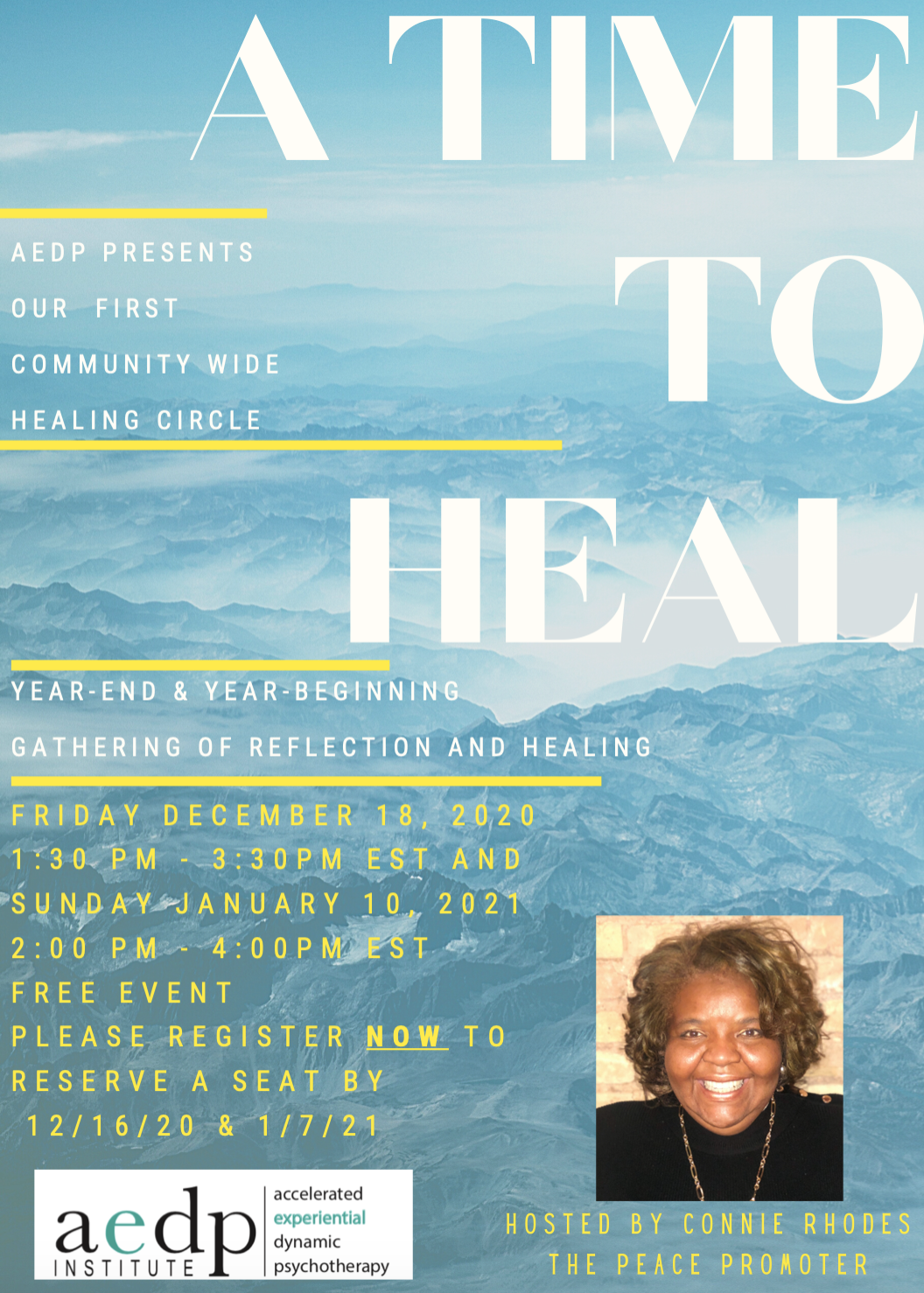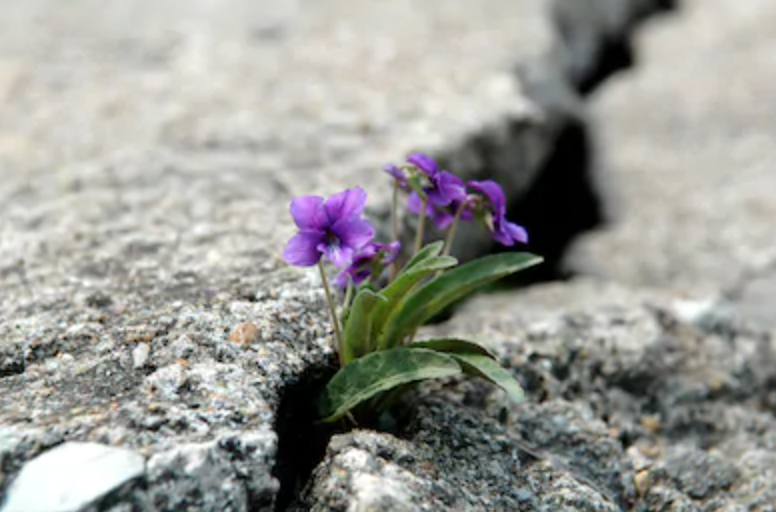A Letter to the AEDP Community
December 11, 2020
Dear AEDP Listserv Community and Members,
Earlier this fall, I made a commitment to, by December 15th, get back to the listserv community to share some of the specifics of the antiracism work that we are doing as an Institute. I appreciate the importance of doing this and am glad today to update you on what we have been doing as an Institute and on some of our plans for moving forward.
However, before I get to the specifics, it is important to say the following: as we acknowledge the centuries of immense pain, historic trauma, brutal colonization, systemic and structural racism and overall oppression, more than ever we realize that ours is a work in progress; as an Institute, we also acknowledge that we have a long way to go.
That withstanding, here’s what we have created, developed and implemented over the past few months and our intentions for the future. Crucial in these efforts have been: our DE&I committee; our Diversity Scholarship committee; the voices and work and courage of so many in our community who have stepped up; our Black and IPOC anti-racism consultants and partners; and each of you. All of these have informed and guided our work.
LENGTH ALERT: What follows is long. I want to be as substantive, comprehensive, and detailed as I can. It is in three sections: A. Actions; B. Partners; and C. Preliminary Discoveries
Here goes:
A. ACTIONS
— In Solidarity.. Black Lives Matter Letter
Our “In Solidarity… Black Lives Matter” letter was written shortly after the murder of George Floyd, and was sent to everyone on our AEDP e-mailing list (read the letter here). It outlined our determination to be on the side that fights racism, inequality and white supremacy, which starts with our own work. We outlined some of our goals predicated on the intention to “do the next right thing” and the one after that, and the one after that.
— ‘Pay-what-you-wish,’ no-questions-asked, Online Trainings for Self-identified Black therapists: AEDP Institute’s Pilot Program: July 1, 2020 – June 30, 2021
Making the implicit explicit, in acknowledgment of the immeasurable toll of, specifically, systemic anti-Black racism, we are piloting a new policy, practice and language with respect to course fees for self-identified Black mental health professionals: a ‘pay what you wish’ policy for AEDP online courses and trainings.
Since the program’s inception, a steadily growing number of Black therapists, mental health professionals and students from North America and around the world have participated in AEDP sponsored seminars and courses on a ‘pay-what-you-wish’ basis with no application required.
— Expanded Diversity Scholarships
In 2017, the Institute started the Diversity Scholarship Program for AEDP Immersion, Essential Skills courses, and Institute sponsored seminars. This program has awarded over 100 scholarships to BIPOC, LGBTQ+ and people working with marginalized or underserved populations. These scholarships have directly led to our courses becoming markedly more diverse and inclusive. In 2020, we added scholarships for those dealing with financial hardship as a result of the pandemic as well as discounts and scholarships for non-US participants. Ironically, the pandemic and the resulting need to move courses online where costs are lower for both the Institute and the participants has made these scholarships possible.
— Our accelerated path to certification and leadership for BIPOC AEDP therapists
We are actively working to provide an accelerated method for progression for BIPOC AEDP therapists to become AEDP experiential assistants, certified therapists, supervisors and faculty. This includes:
A BIPOC-majority Online Core Training Group
Beginning in early 2021, the Institute will sponsor a faculty-led, ‘pay what you wish’ AEDP Core Training for Black and IPOC therapists and mental health professionals. If you are interested in taking part or learning more please contact admin@aedpinstitute.org.
Increased accessibility for Black community members to AEDP supervision
A large number of AEDP faculty and certified supervisors have redoubled efforts to support Black therapists in supervision. The faculty, including myself, and supervisors in the program have committed to a minimum of 60-90 minutes weekly of low cost or free/pay as you wish individual or group supervision for Black members of the AEDP community. Read more here
— Personal education: ongoing individual and collective work with anti-racism trainings, practices and processes
— In April 2020, the AEDP Institute faculty and several admin team members participated in a full day “Groundwater” antiracism training with the Racial Equity Institute (REI).
— In October 2020, the AEDP Institute began a consulting partnership with Dr. Della V. Mosley, PhD, Assistant Professor at the University of Florida & Co-Founder of Academics for Black Survival and Wellness. As part of our consulting relationship, Dr. Mosley made available to the Institute a 15 week online training for non-Black therapists in anti-Black racism. This in-depth training with live, AEDP Colleague Accountability Groups was originally developed by Dr. Mosley and a group of clinical psychologists and others working in academia to help people better understand anti-Black racism and help support Black professionals in the fields of psychology and academics. AEDP community members were invited to participate with costs covered by the Institute for faculty, supervisors, experiential assistants, admin team members and low cost for other members of the community. It includes ongoing, scheduled accountability group meetings. 130 AEDP community members are participating from November 1, 2020 through February, 2021. Learn more about this training here.
— A dedicated DE&I “address” for your input.
We have created a dedicated address — DEI-Committee@aedpinstitute.org — for your input, i.e., input from any member of the AEDP Community. This has been and should be used for sharing your feedback, sending us your suggestions, and voicing complaints and concerns. While this dedicated e-mail is for input of any sort, we particularly welcome your wish lists: what you would like to see in AEDP policies, courses and training that would increase the safety, number and leadership of BIPOC community members, as well as promote education, professional development, creativity, and last but not least… what we might do to promote joy and enhanced learning.
— Healing Circles for the AEDP Community (Upcoming)
See below, in PARTNERS
B. PARTNERS
Our partnership with Black-owned organizations experienced in Diversity, Equity and Inclusion and healing racial trauma.
— We at the AEDP Institute are honored to be partnering with DE&I consultant and Certified Circle Keeper, Connie Rhodes of Culturally Competent Consulting, a Black-owned consulting team based in the Twin Cities in Minnesota (just minutes away from where George Floyd was murdered by the Minneapolis police). Connie is a graduate of the prestigious University of Chicago, and she has 30 years front-line experience helping oppressed and marginalized populations heal from trauma. Also , she is a member of the Minneapolis AEDP Community.
Culturally Competent Consulting has a BIPOC team of experts and advisors with decades of combined experience. This includes: MSW level social workers and community social justice advocates, bilingual consultants (Spanish, ASL, Hmong, Ojibawe and Somali), certified circle keepers who are also receiving training in AEDP tools that they put to use for community healing practices, an attorney who specializes in DE&I as well as conflict resolution, and a physician versed in health disparities / health equity.
Connie Rhodes and her team of consultants will walk alongside us at AEDP as we develop and re-imagine policies and programs that reflect and honor diversity, promote equity and foster inclusion while uplifting the healing properties and transformational potential of the AEDP model.
— Healing Circles
 In fortuitous resonance, AEDP’s healing oriented ethos meets Connie Rhodes and her thirty plus years of work aimed at healing racial trauma and other forms of oppression and inequality.
In fortuitous resonance, AEDP’s healing oriented ethos meets Connie Rhodes and her thirty plus years of work aimed at healing racial trauma and other forms of oppression and inequality.
In the coming weeks and months, the AEDP community will have many opportunities to meet and experience Connie and her team of Circle Keepers.
The first offering is a community-wide healing circle to be offered on two separate occasions: on Friday, December 18, 2020 and again on Sunday, January 10, 2021. Follow this link for the invitation with all the details
— Our work with Dr. Della Mosely and Academics for Black Survival and Wellness.
This work continues through at least February, 2021. Learn more here
— Anti-racism, social justice and DE&I work with other partners from within the AEDP community.
Work in progress. Stay tuned.
C. PRELIMINARY DISCOVERIES
As an Institute, we are committed to and engaged in doing this overdue and much needed work. Along with accomplishments and glimmers of transformance, we have also uncovered painful inequities and open wounds in need of healing. With greater accessibility, the number of Black and IPOC attendees in our courses and seminars has increased. A new feature of our courses is that now, invariably, there is explicit open discussion, including often difficult conversations, about whiteness and issues of race as they relate to what is happening in the training and/or in our clinical work as therapists or in our broader worlds. With wisdom and insight and so much personal experience to draw on, participants, both BIPOC and white, are bringing incredible courage to the courses exploring their feelings, concerns and needs for healing and spaces to be heard. We have had experiences in vivo, sometimes in ways painful to us and wounding to some of our participants, that signal the need for more work for faculty and admin team in order to feel comfortable with being uncomfortable so as to reap the benefits of these vital conversations.
Respectful of confidentiality, we cannot speak for individual community members. However, we have received reports of many experiences, both good and not so good. We have heard from AEDP community members (both BIPOC and white) who shared experiences of being shamed or intimidated on the listserv, or of feeling minimized or unseen in our courses and other AEDP endeavors. We have also heard from AEDP community members (both BIPOC and white) who shared experiences of feeling at ease, coming home and being transformed through speaking up, and being heard. Participants have shared experiences of relief in being in courses with people who look like them and share some of their cultural experiences. And concurrently, after speaking up, some attendees continue to yearn for greater opportunities to be acknowledged, and have their voices heard. And others who are not able to share during these unprecedented and painful times.
As we reflect on our past actions -including silence and inaction- we realize the need to de-center our white, hetero world and accelerate moving the center, to embrace the gifts of Black and IPOC people, as well as others around the world. We have begun to be awakened to other forms of marginalization, including people from other countries who cannot afford “American” prices. On this journey, we have also tuned in more deeply to the fact that our global AEDP members need extra and/or different support. We acknowledge and bear responsibility that we must do our part as an organization with thousands of community members. Our intention is to find new ways to see and hear and support each other.
Our collective aspiration is to ‘make the implicit explicit and make the explicit experiential’ to set the transformational process in motion and keep working at it.
Together as an AEDP community, we can support and expand our DE&I and anti-racism work while holding onto and trusting the best of our core self, as an organization and as individuals, and putting it to work.
I appreciate the opportunity to share these developments with you,
Diana Fosha
On behalf of the AEDP Institute

